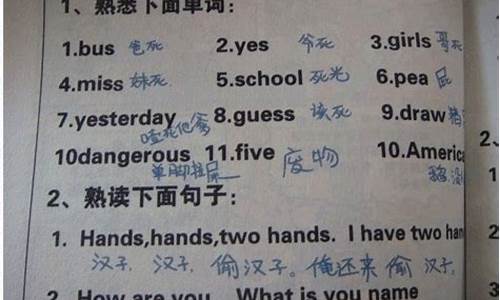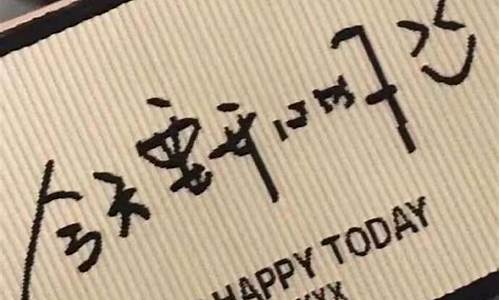笑话的英文单词怎么写_笑话的英文单词怎么写的
作为一名AI机器人,我可以提供与笑话的英文单词怎么写相关的各种信息和建议,包括最新的研究成果和实践经验。
1.笑的英语单词
2.形容“幽默”的英语单词有哪些?
3.嘲笑某人英语是什么?

笑的英语单词
laugh
[lB:f]
vi.
笑, 讥笑
n.
笑, 笑声
laugh
laugh
AHD:[l?f, l?f]
D.J.[l#f, l$8f]
K.K.[l#f, l$f]
v.(动词)
laughed,laugh.ing,laughs
v.intr.(不及物动词)
To express certain emotions, especially mirth, delight, or derision, by a series of spontaneous, usually unarticulated sounds often accompanied by corresponding facial and bodily movements.
笑:为表达某种情感,尤指高兴、快乐或嘲笑而发的一阵自发的,通常是不清晰的声音,并常伴随着脸部和身体的运动
To show or feel amusement or good humor:
感到好笑:表示或感到好笑或非常幽默:
laughed to herself at the memory; an experience we would laugh about later on.
想起这些,她暗自发笑;以后他们会感到好笑的经历
To feel or express derision or contempt; mock:
嘲笑:感到或表示嘲讽和轻视;嘲笑:
We used to laugh at their provincial manners. I had to laugh when I saw who my opponent was.
我们以前常常嘲笑他们粗俗的举止。当我得知我的对手是谁的时候,我感到好笑
To feel a triumphant or exultant sense of well-being:
得意洋洋:因安乐而洋洋得意或欢欣:
You won't be laughing when the truth comes out.
一旦真相被揭露,你就不会洋洋得意了
To produce sounds resembling laughter:
发出类似欢笑的声音:
parrots laughing and chattering in the trees.
鹦鹉在树上欢唱着
v.tr.(及物动词)
To affect or influence by laughter:
用笑声所影响或感染:
laughed the speaker off the stage; laughed the proposal down.
用笑声把演讲者赶下台;用笑声否定了这项提议
To say with a laugh:
笑着说:
He laughed his delight at the victory.
他的笑声表达了他胜利的喜悦
n.(名词)
The act of laughing.
笑
The sound of laughing; laughter.
笑的声音;笑声
Informal Something amusing, absurd, or contemptible; a joke:
非正式用语 笑话,笑柄:可笑的,荒诞的或可鄙的事情;笑话:
The solution they recommended was a laugh.
他们提出的解决办法简直是个笑话
Often laughs Informal Fun; amusement:
常作 laughs 非正式用语 消遣;玩乐:
decided to go along just for laughs.
决定一起去,只为了乐一乐
laugh at
To treat lightly; scoff at:
不以为意;对…一笑置之:
a daredevil who laughed at danger.
鲁莽大胆的蔑视危险
laugh off 或
laugh away
To dismiss as ridiculously or laughably trivial:
一笑置之:把……当作滑稽可笑的琐事而置之不理:
laughed off any suggestion that her career was over.
对有关她事业生涯已经结束的暗示置之不理
laugh up (one's) sleeve 或
laugh in (one's) sleeve
To rejoice or exult in secret, as at another's error or defeat.
幸灾乐祸:偷偷地欣喜或高兴,如对他人的错误或失败
Middle English laughen
中古英语 laughen
from Old English hl?hhan
源自 古英语 hl?hhan
[probably ultimately of imitative origin]
[可能最终源自拟声]
laugh“er
n.(名词)
laugh“ingly
adv.(副词)
laugh
[lB:f]
vi.
笑; 发笑
(自然物等)呈现欢欣景象
They are talking and laughing.
他们边说边笑。
Green pines laugh in the breeze.
青松迎风欢笑。
laugh
[lB:f]
vt.
以笑表示
笑得使...
laugh a hearty laugh
由衷地笑
laugh a reply
以笑作答
He laughed his dissent.
他笑着表示不同意。
laugh
[lB:f]
n.
笑, 笑声
令人发笑的事
嘲笑; [pl. ]玩笑
belly laugh
[美口]纵声大笑; 逗人发笑的事物
holy laugh
[laughing][美]充满宗教热情的笑
horse laugh
捧腹[哈哈]大笑; 嘲弄的笑声
sardonic laugh
轻蔑的笑, 冷笑
burst out laughing
放声大笑
die of laughing
笑得要死
die with laughing
笑得要死
Don't make me laugh.
[口, 讽]你太可笑了, 你真荒谬。
fall about laughing
[口]忍不住大笑
for laughs
[美俚]为了取乐, 作为消遣, 借以开心
get the laugh at sb.(=get the laugh on one's side)
轮到自己嘲笑某人, 胜过某人, 使某人丢脸
get the laugh at sb.(=have the laugh on one's side)
轮到自己嘲笑某人, 胜过某人, 使某人丢脸
get the laugh of sb.(=get the laugh on one's side)
轮到自己嘲笑某人, 胜过某人, 使某人丢脸
get the laugh of sb.(=have the laugh on one's side)
轮到自己嘲笑某人, 胜过某人, 使某人丢脸
get the laugh on sb.(=get the laugh on one's side)
轮到自己嘲笑某人, 胜过某人, 使某人丢脸
get the laugh on sb.(=have the laugh on one's side)
轮到自己嘲笑某人, 胜过某人, 使某人丢脸
get the laugh over sb.(=get the laugh on one's side)
轮到自己嘲笑某人, 胜过某人, 使某人丢脸
get the laugh over sb.(=have the laugh on one's side)
轮到自己嘲笑某人, 胜过某人, 使某人丢脸
have the laugh at sb.(=get the laugh on one's side)
轮到自己嘲笑某人, 胜过某人, 使某人丢脸
have the laugh at sb.(=have the laugh on one's side)
轮到自己嘲笑某人, 胜过某人, 使某人丢脸
have the laugh of sb.(=get the laugh on one's side)
轮到自己嘲笑某人, 胜过某人, 使某人丢脸
have the laugh of sb.(=have the laugh on one's side)
轮到自己嘲笑某人, 胜过某人, 使某人丢脸
have the laugh on sb.(=get the laugh on one's side)
轮到自己嘲笑某人, 胜过某人, 使某人丢脸
have the laugh on sb.(=have the laugh on one's side)
轮到自己嘲笑某人, 胜过某人, 使某人丢脸
have the laugh over sb.(=get the laugh on one's side)
轮到自己嘲笑某人, 胜过某人, 使某人丢脸
have the laugh over sb.(=have the laugh on one's side)
轮到自己嘲笑某人, 胜过某人, 使某人丢脸
have a good laugh
尽情地笑
have a hearty laugh
尽情地笑
have the last laugh
笑在最后; 取得最后胜利
get the last laugh
笑在最后; 取得最后胜利
He is not laughed at that laughs at himself first.
[谚]先自嘲的人, 不会见笑于人。
He laughs best who laughs last.
[谚]最后笑的人笑得最好。
He who laughs at crooked men should need walk very straight.
[谚]要笑别人驼背, 自己就要挺起胸膛走路。
join in the laugh
随着大笑
on the laugh
笑着
raise a laugh
引人发笑
raise a laugh against sb.(=put the laugh on sb.)
使某人成为取笑的对象, 使某人处于可笑的地位
turn the laugh against sb.(=put the laugh on sb.)
使某人成为取笑的对象, 使某人处于可笑的地位
Laugh and grow fat.
[谚]常笑发福, 心宽体胖。
laugh at
因...而笑
嘲笑
付之一笑
laugh away
笑着不理, 付之一笑
笑着消磨时间
laugh down
以笑声打断(讲话等); 以笑声拒绝(建议等)
laugh fit to kill
[口]拼命地笑, 狂笑
laugh off
对...付之一笑; 以笑来排除...
laugh over
笑着谈论; 想着...发笑
laugh sb. out of
以谈笑的方式使某人忘记(忧愁等)
laugh sb. out of worries
以谈笑的方式使某人忘记(忧愁等)
laugh
laugh
AHD:[l?f, l?f]
D.J.[l#f, l$8f]
K.K.[l#f, l$f]
v.
laughed,laugh.ing,laughs
v.intr.
To express certain emotions, especially mirth, delight, or derision, by a series of spontaneous, usually unarticulated sounds often accompanied by corresponding facial and bodily movements.
To show or feel amusement or good humor:
laughed to herself at the memory; an experience we would laugh about later on.
To feel or express derision or contempt; mock:
We used to laugh at their provincial manners. I had to laugh when I saw who my opponent was.
To feel a triumphant or exultant sense of well-being:
You won't be laughing when the truth comes out.
To produce sounds resembling laughter:
parrots laughing and chattering in the trees.
v.tr.
To affect or influence by laughter:
laughed the speaker off the stage; laughed the proposal down.
To say with a laugh:
He laughed his delight at the victory.
n.
The act of laughing.
The sound of laughing; laughter.
Informal Something amusing, absurd, or contemptible; a joke:
The solution they recommended was a laugh.
Often laughs Informal Fun; amusement:
decided to go along just for laughs.
laugh at
To treat lightly; scoff at:
a daredevil who laughed at danger.
laugh off or
laugh away
To dismiss as ridiculously or laughably trivial:
laughed off any suggestion that her career was over.
laugh up (one's) sleeve or
laugh in (one's) sleeve
To rejoice or exult in secret, as at another's error or defeat.
Middle English laughen
from Old English hl?hhan
[probably ultimately of imitative origin]
laugh“er
n.
laugh“ingly
adv.
laugh
中古英语laughen<古英语hleahhan<印欧语词干klég叫出声,发声
laugh,smile,grin,chuckle,sneer
laugh 指哈哈大笑
At that moment, everybody began to laugh and sing.
这时候,大家开始又是笑又是唱。
We all laughed to tears at his funny story.
听了他的滑稽的故事,我们都笑出眼泪了。
smile (名词:smile)指微笑
The inn-keeper smiled and immediately went out.
客栈老板微微一笑便出去了。
The porter and I looked at each other and smiled.
我和脚夫微笑着你看着我,我看着你。
grin (名词:grin)满脸的笑
He grinned from ear to ear.
他满脸堆着笑。
The boy grinned with delight.
那个男孩子高兴得咧着嘴笑。
chuckle (名词:chuckle) 咯咯的笑,抿着嘴发出的笑(声)
He was chucking to himself over what he was reading.
由于书中读到了有趣的东西,他一个人咯咯地笑出了声。
sneer 冷笑
Oh, is it? …said the sheriff with a sneer.
“噢,是吗?”司法官冷笑着说。
注:除此之外,sneer表示看不起人的冷笑,giggle傻乎乎地咯咯笑。如:The funny man amused the girls, so they giggled. mirth 为名词,指欢乐轻快的笑。如:…occasioned great mirth…
laugh
chucklegigglegringuffawhowlroarsmilesnickertittercry
laugh
[lB:f]
vi.
笑,发笑 n.笑
形容“幽默”的英语单词有哪些?
laugh读音:英 [lɑ:f] 美 [l?f]?
vi.笑;发笑;嘲笑;(特别表示因成功而)处于有利地位
vt.以笑表示,以笑感动[影响]
n.笑;笑声;引人发笑的事或人;笑料
第三人称单数: laughs 复数: laughs 现在分词: laughing 过去式: laughed 过去分词: laughed
例句:
1、He was about to offer an explanation, but she was beginning to laugh?
他正要解释,她却笑起来了。
2、Mickey was a good laugh and great to have in the dressing room.?
米基是个活宝,在更衣室里总是逗人笑个不停。
二、smile
读音:英 [sma?l] 美 [sma?l]?
n.微笑,笑容
vt.以微笑表示;以微笑完成
vi.微笑;赞许;不在乎
例句:
1、When he saw me, he smiled and waved?
他看见我的时候,微笑着朝我挥挥手。
2、'Aren't we daft?' she smiled?
她微笑着问:“我们不是很傻吗?”
三、laughter
读音:英 [?lɑ:ft?(r)] 美 [?l?ft?(r)]?
n.大笑;笑,笑声;〈古〉好笑的事;〈美俚〉力量悬殊得可笑的体育比赛
例句:
1、He delivered the line perfectly, and everybody roared with laughter.?
那句台词他拿捏得恰到好处,引得众人哈哈大笑。
2、Their laughter filled the corridor?
整个走廊都回荡着他们的笑声。
扩展资料:
一、ridicule
读音:英 [?r?d?kju:l] 美 [?r?d?kjul]?
n.嘲笑;嘲弄;奚落;戏弄
vt.取笑;嘲笑,嘲弄,奚落;使…受嘲笑
第三人称单数: ridicules 复数: ridicules 现在分词: ridiculing 过去式: ridiculed 过去分词: ridiculed
例句:
1、I don't think his faith should be ridiculed.?
我认为不应该嘲笑他的信仰。
二、laugh at
读音:英 [lɑ:f ?t] 美 [l?f ?t]?
嘲笑;因…而发笑;蔑视;对…满不在乎
例句:
1、The British don't laugh at the same jokes as the French?
法国人觉得好笑的笑话,英国人不一定会笑。
2、When I was a lad his age I would laugh at the strangest things?
我是他那样的小毛孩时,莫明其妙地就会发笑。
嘲笑某人英语是什么?
形容幽默的英文单词:humorous ?读音:英 ['hju?m?r?s]? 美 ['hju?m?r?s]
释义:adj. 幽默的;诙谐的
用法示例如下:
1、He?was?quite?humorous,?and?I?liked?that?about?him.?
他很幽默,我喜欢他这一点。
2、Indeed he has a solemn face, but he is very humorous at heart.
他的确有一副严肃的脸孔,但内心却是很富幽默感。
3、From?the?story,?we?can?see?that?the?wisdom?and?humorous?side?of?a?good?leader.?
从这个故事里,我们看到一个好的领袖智慧和幽默的一面。
扩展资料:
近义词?
amusing、comical、funny、ridiculous
这几个词都可表示“引人发笑的”。
amusing表示“逗笑的,令人开心的”;
funny表示“可笑的,滑稽的”,语意比amusing强,在口语中,还有“不可理解”的意思;
comical表示“喜剧性的,令人捧腹的”,只用于人的表情、行为或某一局面等,很少用来指具体事物;
ridiculous表示“荒谬的,愚蠢的”,有时可引申为“令人发笑的”,具有鄙视的意味。
嘲笑某人英语是laugh at sb。
重点单词:laugh
音标:英[lɑ?f] 美[l?f]
详细释义:
v. 笑; 发笑; (特别表示因成功而)处于有利地位;
n. 笑声; 令人开心的时刻; 引人发笑的事; 笑料; 引人发笑的人; 逗笑好玩的人;
短语搭配:
laugh about?讥笑
laugh against?对…笑
laugh at?对…笑,嘲笑
laugh at a joke?听到笑话大笑
laugh at a person?嘲笑某人
laugh at sb's efforts?嘲笑某人的努力
laugh at the problem?轻视此事
例句:
You should not laugh at the handicapped.
你们不应该嘲笑残疾人。
The disrespectful boylaughed at his father.
那个无礼的男孩嘲笑自己的父亲。
It's not humorous tolaugh at your own jokes.
因你自己的笑话而笑就不幽默了。
The childrenlaughed at the joke.
孩子们听到那个笑话而笑了。
好了,关于“笑话的英文单词怎么写”的话题就到这里了。希望大家通过我的介绍对“笑话的英文单词怎么写”有更全面、深入的认识,并且能够在今后的实践中更好地运用所学知识。
声明:本站所有文章资源内容,如无特殊说明或标注,均为采集网络资源。如若本站内容侵犯了原著者的合法权益,可联系本站删除。












